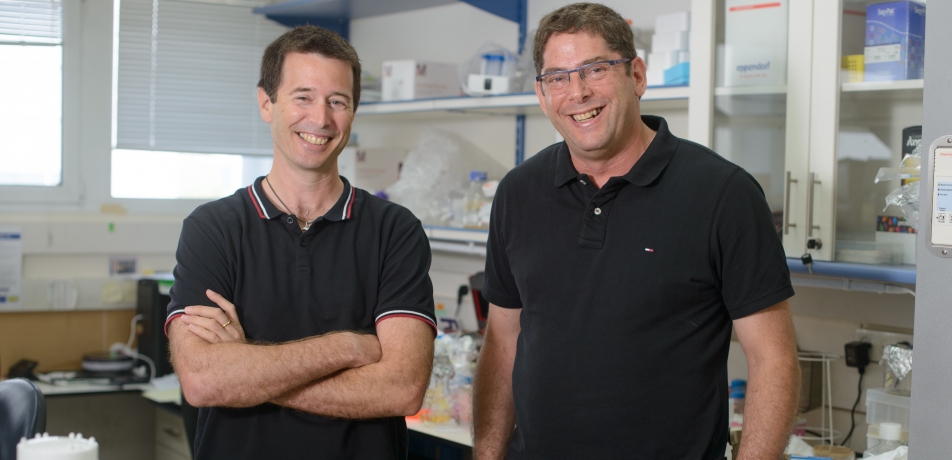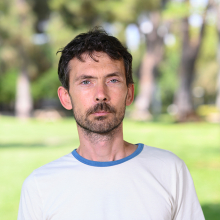BiomX
Prof. Rotem Sorek and Dr. Eran Elinav put microbiome research on the medical map
Briefs

Prof. Rotem Sorek (left) and Dr. Eran Elinav
With the completion of the Human Genome Project in 2003, many believed that scientists had achieved the ultimate map to personalized medicine. But this map became significantly more detailed with—among other discoveries—the realization that the balance of microbes in the human intestine—collectively referred to as the microbiome—has a significant impact on how individuals may develop a range of ailments, as well as how they respond to treatment.
This discovery became the basis of BiomX, a startup that builds on insights that emerged from the Weizmann Institute labs of Dr. Eran Elinav and Prof. Rotem Sorek. BiomX recently raised $24 million in financing from investors who believe in the company’s goal: to develop new drugs and medical therapies based on the modulation of bacteria implicated in disease.
“There are some 100 trillion bacteria that live in the human gut, and they do much more than help us digest dinner,” says Dr. Elinav, a member of the Department of Immunology who pioneered some of the microbiome-based techniques which became the company’s calling card. “The mission of BiomX is to develop effective interventions against clinically significant bacterial targets, in order to help individual patients establish a healthier microbial balance.”
To hit a bacterial bulls-eye, one needs a tiny, and very sophisticated arrow. This is an area in which BiomX draws on the expertise of Prof. Sorek of the Institute’s Department of Molecular Genetics, as well as that of biological engineering expert Prof. Timothy Lu of MIT. Prof. Sorek’s work targets bacteria with phages—viruses that replicate inside bacteria, and in so doing, destroy them. Some of these phages exist in nature. Others are created artificially, with synthetic biology tools that make it possible to build custom phages capable of destroying bacteria that have no natural predators.
Says Prof. Sorek: “We design phage ‘cocktails’ that can wipe out harmful bacteria in the stomach and gut, and which are associated with gastro-intestinal cancer.”
Finding bacterial targets of interest is possible thanks to a screening technology that Prof. Sorek invented in his Weizmann Institute lab. Based on real-time measurements of microbiome response to a range of stimuli, the new platform reveals the specific genes that drive microbiome disorders, and helps identify bacterial species that should be targeted by drugs that modulate the microbiome. It is also an entirely unique approach to disease treatment.
For example, BiomX studies a bacterial species that, in excess, triggers Inflammatory Bowel Disease in a subset of patients. “This paves the way toward new therapeutic options,” says Prof. Sorek. “Rather than treating patients with steroids that inhibit the body’s overall immune response, we can target this specific bacteria with custom-designed drugs.” And as additional bacterial targets are identified, the approach may eventually form the basis of effective, personalized treatments for more patients.
While BiomX’s current strategy focuses on a limited number of microbiome-related conditions, according to company President and Chief Operating Officer Dr. Naomi Zak, the ultimate goal is to achieve proof-of-concept for the therapeutic benefit of microbiome modulation in a wide variety of human ailments.
“The microbiome is believed to be involved in a large range of diseases, from cancer, to diabetes, to autoimmune conditions like rheumatoid arthritis, and may even contribute to depression, ADHD and neurodegeneration,” she says. “That’s why the BiomX approach has very significant potential.”
Dr. Eran Elinav is supported by the Adelis Foundation; Andrew and Cynthia Adelson, Canada; the Estate of Bernard Bishin; Valerie and Aaron Edelheit, Santa Barbara, CA; the Else Kroener Fresenius Foundation; Jack N. Halpern; the Leona M. and Harry B. Helmsley Charitable Trust; the Bernard M. and Audrey Jaffe Foundation; the Lawrence and Sandra Post Family Foundation; the Rising Tide Foundation; John L. and Vera Schwartz, Pacific Palisades, CA; Leesa Steinberg; and Yael and Rami Ungar. Dr. Elinav is the Incumbent of the Sir Marc and Lady Tania Feldmann Professorial Chair.
Prof. Rotem Sorek is supported by the Abisch Frenkel Foundation for the Promotion of Life Sciences and the Leona M. and Harry B. Helmsley Charitable Trust.







